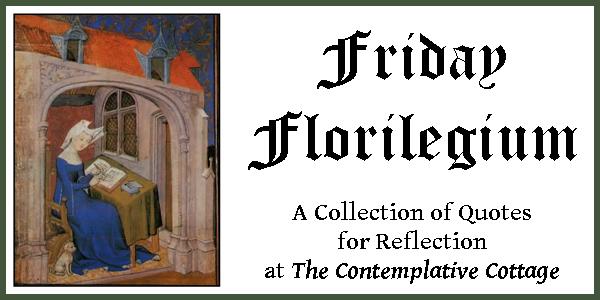Today’s florilegium is from the 32nd chapter of Julian of Norwich’s Revelations of Divine Love. I recommend reading it aloud–this allows the lovely flow of the prose to aid in deciphering her meaning.
Julian’s anchorhold (a little two-room cell with a garden built against a church) was right on a busy street, in Norwich, a town of over 10,000. She had one window that viewed the church altar, one window for people on the street through which people sought spiritual direction, and, most likely, a cat. She is the first woman to write a book in English.
Her book is the fruit of twenty years reflection on visions she had of Jesus during a brief life-threatening illness. Julian wrestled with reconciling the love of Christ with a Christianity of hellfire and brimstone, and the reality of extreme suffering. Her local bishop led a bloody Crusade and burned heretics a half mile from her home. She also witnessed the plague kill 80% of the population of Norwich when she was 6 and then 80% of the children (the adults had some immunity from the first time) when she was nineteen, likely losing her own children.
For all that she would have witnessed, Julian’s book is full of joy and trust that God would “make all things well.”
One time our good Lord said: All things shall be well; and another time he said: Thou shalt see thyself that all manner of thing shall be well; and in these two sayings the soul took sundry [many] understandings:
One was that He willeth we know that not only He taketh heed to noble things and to great, but also to little and to small, to low and to simple, to one and to other. And so meaneth He in that He saith: all manner of things shall be well. For He willeth we know that the least thing shall not be forgotten.
Another understanding is this, that there be deeds evil done in our sight, and so great harms taken, that it seemeth to us that it were impossible that ever it should come to good end.
And upon this we look, sorrowing and mourning therefor, so that we cannot resign us unto the blissful beholding of God as we should do. And the cause of this is that the use of our reason is now so blind, so low, and so simple, that we cannot know that high marvellous Wisdom, the Might and the Goodness of the blissful Trinity. And thus signifieth He when He saith: Thou shalt see thyself all manner of things shall be well. As if He said: Take now heed faithfully and trustingly, and at the last end thou shalt verily see it in fulness of joy.
And thus in these same five words aforesaid: I may make all things well, I understand a mighty comfort of all the works of our Lord God that are yet to come. There is a Deed the which the blessed Trinity shall do in the last Day, as to my sight, and when the Deed shall be, and how it shall be done, is unknown of all creatures that are beneath Christ, and shall be till when it is done.
…
And the cause why He willeth that we know this Deed shall be, is for that He would have us the more eased in our soul and the more set at peace in love—leaving the beholding of all troublous [troubling] things that might keep us back from true enjoying of Him. This is that Great Deed ordained of our Lord God from without beginning, treasured and hid in His blessed breast, only known to Himself: by which He shall make all things well.
For like as the blissful Trinity made all things of nought [out of nothing], right so the same blessed Trinity shall make well all that is not well.

